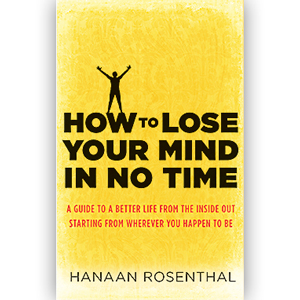
How to Lose Your Mind in No Time
 Before you resolve to become a better parent this New Year, read on. According to How to Lose Your Mind in No Time by Hanaan Rosenthal, the best approach to doing so is not to focus specifically on parenting, rather to recognize that change is interconnected and only successful when treated as part of a whole.
Before you resolve to become a better parent this New Year, read on. According to How to Lose Your Mind in No Time by Hanaan Rosenthal, the best approach to doing so is not to focus specifically on parenting, rather to recognize that change is interconnected and only successful when treated as part of a whole.
Rosenthal gives the effective example of the remodeling of a house to prove this point. If a neighbor’s child broke a window with a ball and you wasted years waiting for them to fix it as you asked, it doesn’t matter how many times you reshingle the roof or retile the kitchen. Your house will never be finished until the window is fixed.
This is why so many resolutions are repeated year after year, as they are one piece of the puzzle that makes up you. When you consciously focus on nagging less or exercising more, you fail to account for your subconscious mind’s role in your success. As far as Rosenthal is concerned, your subconscious controls your actions, and your actions are the result of your subconscious state of mind.
How to Lose Your Mind in No Time is a philosophical book that differs quite a bit from the traditional parenting books I blog about; however, since Rosenthal believes that the meaning of life is simply how we feel, then I’d venture to assume that feeling good about life means feeling good about our parenting. “Life is a collection of shared and personal experiences,” writes Rosenthal. “We live life through our experiences, and everything we experience is filtered through how we feel.”
Rosenthal explains how people divide their thoughts between the past, present, and future. The problem is that neither the past nor the future is reality. The only thing that’s real is the moment you’re in. Therefore, Rosenthal suggests you ask yourself, Is now good? “Whether the now (or present) is good is a result of a single factor: how you feel. Feel good and your present is good.”
We make resolutions because we want more of these good moments in our lives. The problem is that most of the changes we’d like to make, whether it’s with regards to our parenting or simply our personhood, involve parts of ourselves that our subconscious doesn’t allow us to see. Rosenthal calls them blind spots. You know what he means. The way you criticize your overbearing mother but fail to see that you’re driving your own child crazy with your hovering. “Blind spots are habitual actions that the subconscious takes on our behalf, but it prefers to hide from them from us,” Rosenthal argues, “They are hidden because if we saw ourselves do these things we probably would want to stop.”
So if you’re looking for real change this New Year, then Rosenthal claims you need to acknowledge that “there is no reality beyond that which we perceive, and changing how we perceive reality can be a vehicle for dramatic change.” The next step? Accept that nothing in life is random. While this is comfortable for us to think, Rosenthal insists it’s not true. He explains, “Your subconscious is responsible, via a myriad of means, for everything we have and don’t have in our lives.” If you stop planning with your conscious and let your subconscious live out your true desires, Rosenthal believes you’ll have greater success.
As I’m only six chapters into How to Lose Your Mind in No Time, I’m not yet sure of the best strategies for change. (That’s Chapter 13 and part of the next blog post.) However, my daughter wants me to resolve to stop rushing her and I’d like to oblige. I tried reverse psychology when I blogged about You’re Not the Boss of Me by Betsy Brown Braun and I tried confidence building when I blogged about If I Have to Tell You One More Time by Amy McMready. Still, we have these frantic moments whenever we depart the house, no matter how much advanced notice I give or what time of day we go out. If letting go of how things should be and embracing the now provides the opportunity for no more rushing as its part of the whole of contentment as Rosenthal claims, then I suppose I’ll simply resolve to keep reading and start visualizing the changes to come.
Follow @WinterhalterV on Twitter for updates on blog posts or like Parenting by the Book on Facebook.
Read my other blog Befriending Forty.






